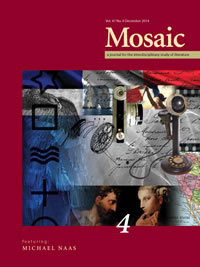Issue 47.4
Overview

General Issue
Published: December 2014
View the issue introduction or see the issue summary and contents below.
8 essays, totalling 192 pages
$21.95 CAD
This issue features new work by Professor Michael Naas, Chair of the Department of Philosophy at DePaul University, on Hélène Cixous. The issue also features an interview with Professor Naas.
Crossings: An Interview with Michael NaasDawne McCance The following interview with Michael Naas took place in Chicago on April 25, 2014. Mosaic is pleased to publish it here. | |
Flicker I: Reflections on Photography and Literature in the Works of Hélène CixousMichael Naas No abstract available. | |
Flicker II: Reflections on Cinematography and Literature in the Works of Hélène CixousMichael Naas No abstract available. | |
(Not) Lost in the Margins: Gender and Identity in Graphic TextsMarjorie C. Allison Female graphic writers have been under-represented in scholarship about the emerging field. This essay argues that Marjane Satrapi, Alison Bechdel, and Rutu Modan use the genre to push in from the (literal and metaphorical) margins to challenge literary, sexual, and nationalist norms through both their storylines and their illustrations. | |
Migrating Modes: Multimodality in E-Poetics as Another Kind of LanguageLaura Shackelford In Birds Singing Other Birds’ Songs and Another Kind of Language, María Mencía’s poetics of transposition diagnoses the technological, medial, and poetic processes catalyzing multimodal signifying practices in digital writing and comparatively registers the impact of digital interface relations, as transformative material sites, on language and intersemiotic and intersubjective meaning. | |
Chosen Literatures: Core Languages, Peripheral Languages, and the World Literary SystemAlbert Braz Through an examination of the international fate of João Guimarães Rosa’s Grande Sertão: Veredas, this essay contends that those texts that are able to enter world literature in the language in which they are originally written have a critical advantage over those that can do so only through translation. | |
At the Boundary of the Mighty World: Charles Olson and HesiodGary Grieve-Carlson Despite his well-known dismissal of the classical Greek tradition, Charles Olson alludes to Hesiod surprisingly often in his poetry and prose. This essay asks why Olson found Hesiod useful and suggests that earlier critics have misread the nature of Olson’s relationship to Hesiod. | |
‘Just Say No’: Eden Robinson and Gabor Maté on Moral Luck and AddictionSabrina Reed Dr. Gabor Maté’s In the Realm of Hungry Ghosts and Eden Robinson’s short story “Contact Sports” and subsequent novel Blood Sports can be read as critiques of the War on Drugs and its slogan, Just Say No. This essay examines how Maté’s and Robinson’s discussions of addiction and drug culture in Vancouver’s Downtown Eastside reflect Bernard Williams’s and Thomas Nagel’s conception of moral luck. |